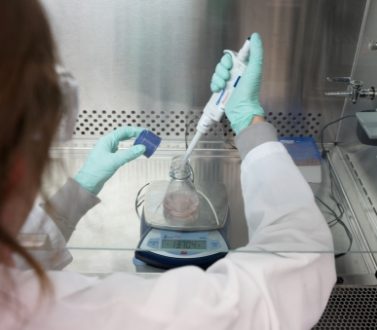Genentech Oncology
Featured Initiative: Shining a Light on Disparities in Access to Comprehensive Biomarker Testing
Collaboration with OneOncology
Delivering on precision medicine is an essential mark of quality care, and an obligation for all of us working in oncology.

—Dr. Davey Daniel, OneOncology’s Chief Medical Officer
From day one, we’ve been focused on the adoption and utility of biomarker testing, which are some of today’s most urgent barriers to personalized cancer care. We wanted to create a learning loop, where we’re piloting solutions and then using real-world data to evaluate and refine.

—Dr. Nancy Yao, Vice President Oncology-Hematology Medical Affairs, Genentech
Problem
- Comprehensive biomarker testing, such as next-generation sequencing (NGS), is critical to identifying actionable mutations and biomarker-driven targeted therapies1
- Based on a study, lung cancer patients with actionable mutations experience better outcomes with timely access to targeted therapy compared with non-targeted therapies; these benefits are even seen in people who switch from non-targeted therapies to targeted therapy within 42 days after biomarker test results are available2
- Despite the evidence supporting comprehensive biomarker testing, many people with lung cancer who are eligible for NGS lack access to testing, particularly Black and Latino patients, perpetuating inequities in treatment outcomes1
An example of how we’re addressing the problem
- We formed a first-of-its-kind collaboration with OneOncology, a network of community oncology practices
- Our overall aim: to advance personalized medicine in community oncology, with a focus on equitable adoption and utilization of biomarker testing
- A real-world data study was conducted to dig deeper into inequities in access to timely NGS testing

What We Found
Our data revealed drivers of inequities in access to NGS testing at the practice and provider levels3
In a retrospective observational study, 12,045 patients with advanced NSCLC who received treatment in the community care setting were evaluated, including N=9,981 white, N=1,528 Black, and N=536 Latinx.
Racial inequity in NGS testing was observed: white patients have a NGS testing rate of 51%, which was about 8% higher than non-Latinx Black and Latinx patients.3,4
What's Next
Unequal NGS testing is an undeniable driver of disparities in personalized cancer care. It’s time to move from characterizing inequities to designing, implementing and evaluating solutions. This study tells us that we need to be intervening at the level of individual practices and providers so every patient will have timely access to testing.

—Dr. Nancy Yao, Vice President Oncology-Hematology Medical Affairs, Genentech
By identifying the main contributors to inequities in timely NGS testing, this research provides the insights to inform the design and implementation of programs that aim at equitable and timely NGS testing in the US community setting.
Related case study:
Reducing Healthcare Disparities Through Public Policy
In collaboration with healthcare advocacy groups, we are educating state and federal policymakers about the clinical value of biomarker testing, with the aim of gaining support for legislation that improves equitable access to testing.
View the full case study to learn more about our policy efforts to support biomarker testing.

-
-
Schwartzberg L, Daniel D, Vaena D, et al. Improving biomarker testing in advanced non-small-cell lung cancer and metastatic colorectal cancer: experience from a large community oncology network in the USA. Future Oncol. 2023;19(20):1397-1414.
Schwartzberg L, Daniel D, Vaena D, et al. Improving biomarker testing in advanced non-small-cell lung cancer and metastatic colorectal cancer: experience from a large community oncology network in the USA. Future Oncol. 2023;19(20):1397-1414.
-
Stricker T, Jain H, Yu E, et al. Clinical value of timely targeted therapy (TT) for patients with advanced non-small cell lung cancer (aNSCLC) with actionable driver oncogenes (ADO). Presented at: American Society of Clinical Oncology, June 2-6, 2023; Chicago, IL. Accessed September 8, 2023. https://meetings.asco.org/abstracts-presentations/218049
Stricker T, Jain H, Yu E, et al. Clinical value of timely targeted therapy (TT) for patients with advanced non-small cell lung cancer (aNSCLC) with actionable driver oncogenes (ADO). Presented at: American Society of Clinical Oncology, June 2-6, 2023; Chicago, IL. Accessed September 8, 2023. https://meetings.asco.org/abstracts-presentations/218049
-
Vidal G, Jain N, Fisher A, et al. Practice- and provider-level inequities in next-generation sequencing (NGS) testing by race/ethnicity for patients (pts) with advanced non-small cell lung cancer (aNSCLC) treated in the community setting. Presented at: American Society of Clinical Oncology, June 2-6, 2023; Chicago, IL. Accessed September 8, 2023. https://meetings.asco.org/abstracts-presentations/219916
Vidal G, Jain N, Fisher A, et al. Practice- and provider-level inequities in next-generation sequencing (NGS) testing by race/ethnicity for patients (pts) with advanced non-small cell lung cancer (aNSCLC) treated in the community setting. Presented at: American Society of Clinical Oncology, June 2-6, 2023; Chicago, IL. Accessed September 8, 2023. https://meetings.asco.org/abstracts-presentations/219916
-
Sheinson DM, Wong WB, Meyer CS, et al. Trends in use of next-generation sequencing in patients with solid tumors by race and ethnicity after implementation of the Medicare National Coverage Determination. JAMA Netw Open. 2021 Dec 1;4(12):e2138219. doi: 10.1001/jamanetworkopen.2021.38219
Sheinson DM, Wong WB, Meyer CS, et al. Trends in use of next-generation sequencing in patients with solid tumors by race and ethnicity after implementation of the Medicare National Coverage Determination. JAMA Netw Open. 2021 Dec 1;4(12):e2138219. doi: 10.1001/jamanetworkopen.2021.38219
-
-